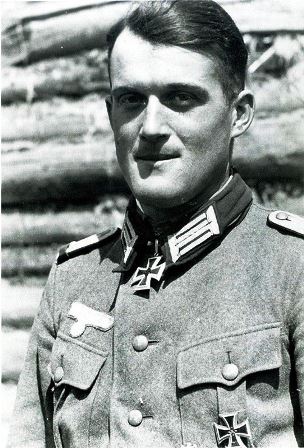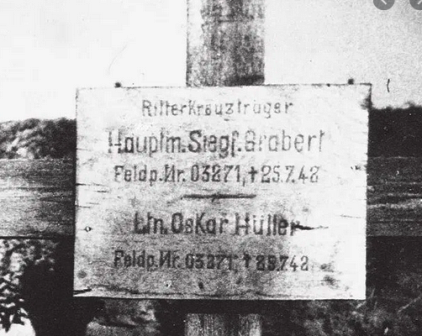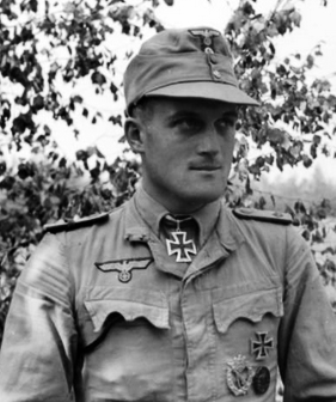Grabert, Siegfried (Brandenburg)
- Date of birth:
- January 11th, 1916 (Schorndorf/Württemberg, Germany)
- Date of death:
- July 25th, 1942 (Bataisk, Soviet Union)
- Buried on:
- German War Cemetery Krasnodar-Apscheronsk
- Nationality:
- German
Biography
Siegfried Grabert was posthumously promoted to Major der Reserve, after he was reported missing in action since July 25th, 1942. His name has been engraved in a monument on the German War Cemetery Krasnodar-Apscheronsk.
1934-1937: Wehrdienst - promoted to Leutnant der Reserve
Summer 1939: Leutnant der Reserve - Bau-Lehr Bataillon z.b.V. 800
31.08-01.09.1939: Kampfverband 'Ebbinghaus' - sabtage of the railway station in Kattowitz
1940: campaign in Belgium and France as Kompaniechef - Lehr-Regiment Brandenburg z.b.V. 800 : sabotage of bridges
01.03.1941: promoted to Oberleutnant der Reserve - campaign in the Balkans
destruction of Vardar bei Axiupolis's bridges in the north of Greece
End 1941: Kompaniechef, 8. Kompanie / II./ Bau-Lehr-Bataillon z.b.V. 800 - campaign in Russia
Assault to Caucasus - took the bridges on the Don-Delta near Rostov/Don with several heavy casualties - being himself deadly WIA and DOW
Do you have more information about this person? Inform us!
- Period:
- Second World War (1939-1945)
- Rank:
- Oberleutnant der Reserve (1st Lieutenant of Reserves)
- Unit:
- Führer Sonderkommando Bau-Lehr-Bataillon z.b.V. 800 "Brandenburg"
- Awarded on:
- June 10th, 1941
“Leutnant Grabert had already distinguished himself in the West. During the forward advance in northern Greece it was his leadership abilities and fearless devotion to duty that ultimately prevented the destruction of the 400 metre long road bridge over the Vardar river east of Axiupolis at the last minute. He personally captured those Englishmen who had the mission of blowing the bridge sky high. With this the only available bridge over the Vardar river fell into German hands. This in turn enabled friendly forces to immediately pursue the fleeing enemy without any loss of time.”
This action took place on the 12.04.1941. On this day Leutnant Grabert and his Brandenburgers prevented the destruction of the bridge, captured the British demolitions team,and then held the bridge with the limited forces available for about 90 minutes until the arrival of reinforcements.
- Period:
- Second World War (1939-1945)
- Rank:
- Hauptmann der Reserve (Captain of Reserves)
- Unit:
- Chef 8. / Lehr-Regiment z.b.V. 800 "Brandenburg"
- Awarded on:
- November 6th, 1943
Grabert would posthumously receive the Oakleaves for this costly yet vital success that his men had achieved here.
320th Award.
Awarded posthumously.
- Period:
- Second World War (1939-1945)
- Awarded on:
- June 2nd, 1940
- Period:
- Second World War (1939-1945)
- Awarded on:
- May 14th, 1940
- Period:
- Second World War (1939-1945)
- Period:
- Second World War (1939-1945)
- Period:
- Second World War (1939-1945)
Sources
- Photo: Siegfried Grabert - Wikidata
- "Gate to Leningrad" Porechye Bridge | Weapons and Warfare
- File:Bundesarchiv Bild 101I-210-0219-02A, Russland-Nord, Siegfried Grabert.jpg - Wikimedia Commons - - FELLGIEBEL, W.P., Elite of theThird Reich, Helion & Company Limited, Solihull, 2003.
- THOMAS, FRANZ & WEGMANN, GüNTER, Die Eichenlaubträger 1940-1945, Biblio-Verlag, 1997.
- Volksbund Deutsche Kriegsgräberfürsorge e.V.
- Siegfried Grabert | Military Wiki | Fandom
- The dark world of Hitler's elite Brandenburger troops | Daily Mail Online
- https://www.bundesarchiv.de/DE/Content/Virtuelle-Ausstellungen/Die-Brandenburger-Kommandotruppe-Und-Frontverband/002__hauptmann-grabert_PDF.pdf?__blob=publicationFile











